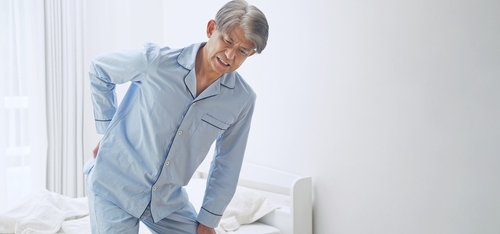

Notice: Coppell Office Moving Soon | New Address: 897 N MacArthur Blvd, Ste 110, Coppell, TX 75019


Low back pain is one of the most common complaints people experience, affecting millions worldwide. It can interfere with daily activities, making it difficult to sit, stand, or move without discomfort. While back pain has many causes, one of the most prevalent reasons behind sharp or radiating pain is a slipped disc, also known as a herniated disc.
Let’s help you recognize the key signs of a slipped disc and guide you through the treatment options available to relieve your pain and get you back to feeling your best.
The spine consists of a series of vertebrae, with intervertebral discs acting as shock absorbers between each vertebra. These discs have a tough outer layer and a soft, gel-like center. When the outer layer weakens or ruptures, the inner material can push out, causing a herniated or slipped disc.
A herniated disc occurs when the disc compresses, bulges, or ruptures, often irritating nearby nerves. This nerve irritation causes the sharp or radiating pain that many individuals experience. While general back pain can stem from muscle strain or other issues, a slipped disc often leads to nerve problems that extend beyond the back.
If you are experiencing any of the following signs of a slipped disc, you may be dealing with a herniated disc:
The most common symptom of a slipped disc is a sharp pain in the lower back. This pain may be localized or radiated down the buttocks. It often intensifies with movement, such as bending or lifting.
One of the hallmark symptoms of a slipped disc is sciatica, which refers to pain that shoots down one leg, often to the foot. This occurs when the herniated disc compresses the sciatic nerve, causing sharp, shooting pain.
Nerve compression from a slipped disc can lead to tingling or numbness in the legs, feet, or toes. This sensation may feel like pins and needles and is a sign that the nerve is affected.
As nerve irritation progresses, it can lead to muscle weakness in the legs or lower body. This can affect your ability to walk or perform everyday activities like climbing stairs or standing for long periods.
The pain caused by a herniated disc typically worsens with activities like sitting for extended periods, bending forward, or lifting heavy objects. These actions can put additional pressure on the disc, exacerbating pain and discomfort.
Not all back pain results from a slipped disc; many people experience mild soreness that resolves independently. However, certain red flags suggest you should seek professional help for a more serious issue:
If any of these symptoms persist or worsen, it’s crucial to consult a healthcare provider for an accurate diagnosis and appropriate treatment.
Treatment for a slipped disc varies based on the severity of the condition. Here are some common approaches:
For mild to moderate cases, doctors often recommend conservative treatments such as:
If the pain persists or worsens, more advanced treatments may be necessary:
In severe cases where conservative treatments do not work, surgery may be recommended. This could involve removing the herniated portion of the disc or even performing a disc replacement. Surgery is typically considered a last resort when other treatment options have failed.
Managing back pain from a slipped disc is essential to improving quality of life. Pain management specialists play a key role in identifying the cause of the pain and providing treatments to help reduce discomfort.
A personalized pain management plan may include:
Working with a specialist ensures that your treatment is tailored to your specific needs and helps manage long-term discomfort effectively.
Early detection and treatment of a slipped disc are key to reducing pain and improving recovery. If you are experiencing sharp back pain, radiating pain down the leg, or numbness, it’s essential to seek treatment as soon as possible to avoid complications.
At Apex Interventional Pain & Spine, we specialize in providing effective back treatment for herniated discs and other spine-related issues. If you're experiencing back pain or suspect you may have a slipped disc, don’t wait to seek help. Contact us at (972) 833-7246 or schedule an appointment today to get the care you need and relieve your pain.